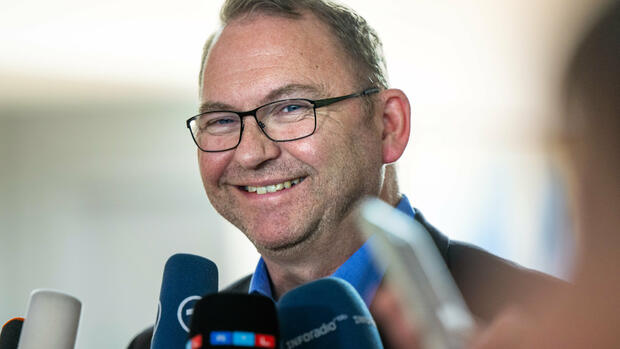Frank Werneke, chairman of the verdi trade union, negotiated on behalf of public sector employees.
(Photo: dpa)
Berlin The approximately 2.5 million public sector employees get significantly more money in view of the high inflation: the federal government, municipalities and unions agreed on higher tariffs late on Saturday evening in the fourth round of negotiations after several hours of talks in Potsdam, as all parties involved announced.
Among other things, the agreement provides for tax and duty-free special payments totaling 3,000 euros in several stages. EUR 1,240 of this should already flow this June, and a further EUR 220 each in the months from July to February 2024.
From March 2024 there will then be a base amount of 200 euros as a wage plus and then 5.5 percent more money. If no increase of 340 euros is achieved, the relevant increase amount should be set to this sum.
With this solution, the parties to the collective bargaining largely based themselves on the compromise proposal from the arbitration proceedings that ended a week ago. The term of the agreement is to be 24 months. On average, wages and salaries will rise by around eleven percent from March next year, and by up to 16.9 percent for lower salary groups.
“We have accommodated the unions as much as we can still be responsible for in a difficult budget situation,” said Federal Interior Minister Nancy Faeser (SPD) after the round of negotiations. She spoke of a “good and fair collective agreement” that would bring noticeable relief to employees. The tax and duty-free payments would quickly make themselves felt in the wallet.
Costs are in the billions
She put the costs for federal employees alone at 1.4 billion euros. If the degree, as demanded by the unions, is also transferred to civil servants and pensioners, the costs for the federal government will rise to almost five billion euros.
With our decision to make this compromise, we went to the pain threshold Verdi boss Frank Werneke
“In percentage terms, the table increases alone – depending on the salary groups – are between eight and 16 percent,” said DBB national chairman Ulrich Silberbach after the conclusion of the negotiations in Potsdam. More could not be enforced, especially with the municipalities, but in view of the financial weakness of many municipalities, this is a real house number.
According to Verdi boss Frank Werneke, the negotiations were not easy. “With our decision to make this compromise, we went to the pain threshold,” he said.
However, it is positive that the conclusion would mean a table-effective increase of up to 16.9 percent – the vast majority of employees thus received an increase of over eleven percent. “This is a sustainable increase in income, which is considerable.”
Werneke also sees weaknesses in the result
However, the result also has weaknesses. This includes the long term and the relatively late increase in the table, said Werneke. Above all, the unions were unable to push through the minimum amount of 500 euros they had demanded.
The parties in Potsdam had been struggling to find a solution since Saturday afternoon. Previously, three rounds of negotiations, some of which were accompanied by massive warning strikes, had not brought a solution, so that the unions declared that the talks had failed and the employers called for arbitration.
Frank Werneke, Chairman of the United Services Union Verdi, speaks between Federal Interior Minister Nancy Faeser (SPD, left) and Karin Welge, President of the Association of Municipal Employers’ Associations.
(Photo: dpa)
Originally, Verdi and the civil servants’ association went into the negotiations with the demand for 10.5 percent more wages, but at least 500 euros a month, over a period of twelve months.
The solution found poses particular challenges for the many cash-strapped municipalities in Germany. The President of the Association of Municipal Employers’ Associations (VKA), Mayor of Gelsenkirchen Karin Welge, spoke of the “most expensive collective bargaining agreement of all time” following the collective bargaining agreement.
Welge put the costs at 17 billion euros, of which 13 billion euros are a permanent annual burden. In return, the municipalities would have had planning security thanks to the long term of 24 months.
A strike ballot among the unions and possible indefinite strikes are off the table with the agreement. However, Verdi will still present the agreement to its members, so that the Federal Tariff Commission will not make a final decision on the tariff compromise until May 15th.
With agency material from Reuters and dpa.
More: Arbitrators recommend more income and one-time payment
